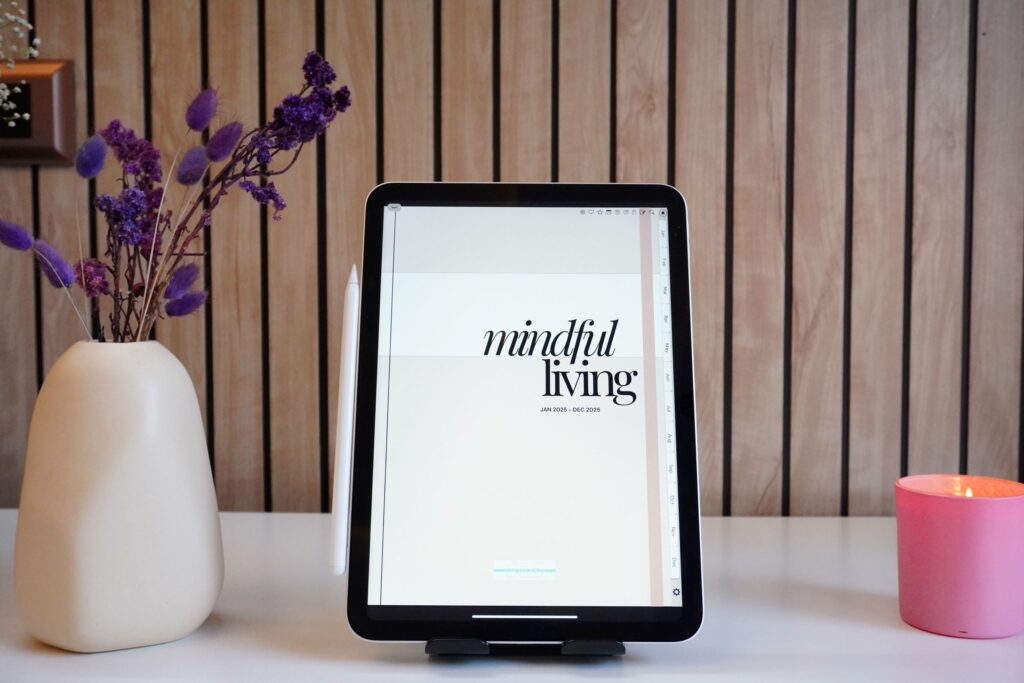Journaling sounds great in theory, but keeping up with it every day? That’s where most people struggle. If you’re trying to figure out how to stay consistent with journaling, here are some easy and practical tips to help you make it part of your routine.

Every single day that passes is a day we won’t get back. Our time on this planet is limited, and that time is getting shorter with each passing day.
If I ask you to think about how many days of your life you actually remember, chances are, not many.
Maybe the big ones like graduations, weddings, the day you became a parent, or a special trip. But what about all the other days? Are they not worth remembering?
I know not every day is exciting, but there are so many moments that might seem small at the time but are still worth holding onto.
Like that day you had a deep conversation with an old friend, the time you got a heartfelt compliment at work, or even the lazy Sunday when you binge-watched your favorite show with a tub of ice cream.
These little things make up our lives just as much as the big events do.
And this is exactly where journaling comes in. One of the biggest benefits of journaling is that it helps you capture those moments, both big and small, so you can look back and remember them.
For me, journaling isn’t just about keeping a record of my life. I use it to plan my days, clear my head, and make sense of my thoughts and emotions. It helps me stay on track with the life I want for myself and my family.
But like so many others, I’ve struggled with journaling consistency. We all start with good intentions, but staying consistent is the hard part.
If you’ve also wondered how to stay consistent with journaling, you’re not alone. Let’s talk about some simple ways on how to actually stick to a journaling routine.
5 Common Reasons Why We Struggle to Stay Consistent with Journaling
If you want to understand how to stay consistent with journaling, the first step is figuring out why it’s so hard to keep up with it in the first place.
A lot of people start journaling with good intentions but find themselves quitting after a while. Why does that happen? Let’s talk about some of the most common journaling challenges and what gets in the way.
1. No Time to Journal
Life moves fast. Between work, family, responsibilities, and just trying to keep up with everything, finding time to sit down and write can feel impossible.
We live in a world that demands so much from us every single day, and when you’re already juggling a million things, journaling takes a backseat. You tell yourself you’ll do it later, but later never comes.
2. Not Sure What to Write in the Journal
This is one of the biggest journaling struggles: staring at a blank page with no idea where to start. If you don’t have a structure or a prompt, you can spend more time wondering what to write than actually writing.
And when journaling starts to feel like a task rather than an outlet, it’s easy to close the journal and move on.
Related Blogs:
3. Perfectionism
This is something I have experienced myself. When I picked up journaling again in 2021 after my doctor suggested it, I wanted to do it “the right way”. You know, the way it looks on Instagram.
Beautiful handwriting, aesthetic layouts, color-coded sections. But the pressure to make it look perfect can be overwhelming.
Instead of focusing on what journaling is actually about, expressing yourself, you start worrying about making it look presentable. And when you can’t do that, you just stop altogether.
4. Losing Motivation Over Time
Think about New Year’s resolutions. They start strong in January, but by February or March, most of them fizzle out. Journaling can be the same way.
At first, it feels exciting. You’re committed, you’re writing every day. But as time goes on, the novelty wears off. One skipped day turns into two, then a week, and before you know it, you’ve forgotten all about it.
5. Forgetting to Journal
If journaling doesn’t naturally fit into your routine, it’s easy to forget about it completely. And if you’re only doing it because someone told you it’s good for you, it might feel like just another chore on your already packed to-do list.
When journaling feels like work rather than something you enjoy, it’s no surprise that it eventually slips from your mind.
These writing barriers make journaling seem harder than it actually is, but the good news is that there are ways to overcome journaling obstacles and make it a habit that sticks.
Before we talk about how to stay consistent with journaling, let’s talk about some benefits of journaling consistently.

7 Most Common Benefits of Journaling Consistently
1. Helps You Process Your Emotions
This is one of the biggest and most common benefits of journaling. It helps you process your emotions in a healthy manner.
It gives you a safe space where you can be really honest with yourself and write down exactly what and how you’re feeling. You don’t have to worry about someone judging you or fear being embarrassed in front of anyone.
2. Clears Your Mind and Improves Focus
There are so many days when there’s too much on our minds, something we were supposed to do but forgot, things we need to do today, thoughts about certain events in the past, and so much more.
If you write all these things down, they feel a little less overwhelming. You can see everything on paper, which makes it easier to understand and solve.
3. Encourages Self-Reflection and Growth
From the moment we wake up to the moment we go to bed, most of the time, we’re running on autopilot because there is just so much to do.
We don’t take any time to reflect on our actions, emotions, or decisions. Journaling forces you to slow down and get to know yourself better.
4. Boosts Creativity
Unlike structured forms of writing, journaling gives you complete creative freedom. You can write freely, brainstorm ideas, doodle, or experiment with storytelling, whatever feels right to you.
5. Improves Communication Skills
It is a no-brainer that the more you do something, the better you get at it. The same goes for journaling as well. The more you write, the better you get at communicating and expressing yourself.
Over time, your vocabulary improves, you’re able to express yourself better, you structure your ideas more clearly, and your written and verbal communication becomes better and more effective.
6. Journaling Can Improve Physical Health
This might be a little hard to believe, but apart from the mental health benefits of journaling, there are physical health benefits as well.
Studies show that writing about how you feel or expressing yourself through writing can improve your immune system as well.
If you have any chronic condition like me, you can use your journal to document your symptoms, triggers, diet, daily routine, stress levels, and effectiveness of the medicines you’re taking.
You can then discuss them with your doctor to come up with a better management plan.
Related Blog:
- 13 Benefits of Writing for Mental Health and Personal Growth
- How to Start a Health and Wellness Journal?
7. Journaling Improves Memory and Cognitive Function
The other benefit of journaling is that writing things down strengthens your memory and improves cognitive function. When you recall and organize details, you reinforce them in your mind, making them easier to remember.

5 Simple Ways to Stay Consistent with Journaling
Let’s now try to answer the question of the hour: How to stay consistent with journaling? Starting is easy, but sticking to it can be tricky.
So, let me share some simple journaling tips that have worked for me in the past. You can take inspiration from them and come up with your own journaling routine that fits your lifestyle.
1. Pick a Journal You Love
I’ve always loved stationery. I can’t even count how many diaries and journals I’ve bought over the years, though I haven’t written in all of them!
But that’s the thing, right? When you love something, you naturally want to come back to it. The same goes for journaling. Pick a journal or diary you love, and you’ll feel more excited to write in it.
I used to write in a physical journal, and I still do sometimes, but these days, I mostly use a digital planner that my husband and I designed ourselves.
Find what works for you, whether it’s a notebook, a fancy journal, or a digital planner.
The first tip to start journaling and maintain a consistent writing schedule is to pick something you genuinely want to return to every day.
2. Start Small and Try to Write Daily
If you’re new to journaling or getting back into it, don’t stress about filling pages or making them look Pinterest-perfect or Instagram-worthy.
The goal is to build a habit, so start small. Set realistic journaling goals and achievable writing targets that work for you.
One great way to create a consistent journaling routine is by trying morning pages, a technique by Julia Cameron.
The idea is to write three pages every morning about whatever comes to mind. But don’t feel pressured. Write as much or as little as you can. The point is to make writing a natural part of your day.
3. Create a Routine
If there is one journaling tip I can give you to maintain a daily journaling habit, it is to pair it with something you already enjoy doing. This is called habit stacking, where you pair a new habit with an existing one to make it stick.
For example, I usually journal in the morning on days I work from home. I make myself a warm cup of herbal or chamomile tea, sit by the window, and write for about 20-25 minutes while sipping my tea.
This simple routine makes journaling feel effortless and enjoyable. Try pairing it with your morning coffee, bedtime routine, or even a workout cooldown.
4. Use Prompts
I understand that starting with a blank page can be really daunting. And on some days, you may feel stuck or uninspired to write.
In such cases, you can use journal prompts to get started. No matter what you’re journaling about like self-reflection, gratitude, or stress relief, there are plenty of journal prompts online to help you get started.
I’ll also link a few of my blogs where I’ve shared some simple prompts for overcoming writer’s block.
Related blogs:
- 41 Journal Prompts For Self-Care And Mental Health
- 21 Morning Journaling Prompts for a Mindful Day
- 35 Inspiring Spring Journaling Prompts for Personal Growth
5. Be Kind to Yourself and Reward Your Effort
Journaling isn’t a phase but a lifelong habit I want to keep. If you feel the same, remember to be kind to yourself.
Some days, you’ll write pages, and on other days, you might only manage a few lines or skip journaling altogether. And that’s completely okay.
If you want journaling to be a consistent and sustainable habit, don’t be too hard on yourself when you miss a day.
Just pick up where you left off as soon as you can. Celebrate your small wins, whether it’s journaling for a week straight or writing something meaningful.

How Do You Journal Without Overthinking?
One of the biggest challenges I’ve faced with journaling is overthinking. Worrying about what to write, whether it sounds right, or if it even matters.
But journaling isn’t about perfection, it’s about self-expression. Your journal is your personal space. No one else is going to read it (and honestly, no one should).
So why stress over making it “good” or meaningful? That pressure takes away the very essence of journaling.
Your journal doesn’t have to be polished. Messy handwriting, incomplete thoughts, and even spelling mistakes are all okay. The goal isn’t to write beautifully, it’s to be honest with yourself. Let your thoughts flow without judging them.
This is another tip on how to stay consistent with journaling and maintain a journaling routine. Let go of the idea that your writing needs to be perfect.
The more you allow yourself to write freely, the more you’ll enjoy journaling for what it truly is: a space for self-reflection, creativity, and personal growth.
So, write without fear, embrace the mess, and just let your writing be a reflection of your thoughts.
Related Blog: How to Journal for Overthinking
Wrapping Up – How To Stay Consistent With Journaling
Journaling is one of the most potent tools in the mindful living toolkit, and I think this is one of those habits that each one of us should have to navigate the uncertain waters of this fast-paced and modern world.
We all deal with so much pressure and stress every day, and over time, it takes a toll on our mental and emotional well-being.
Among many others, it is also one of the self-care practices that I feel truly helps. It might not show immediate results, but if you stick with it long enough, you’ll realize just how powerful this simple habit can be.
I hope this blog gave you some inspiration and helpful insights on how to stay consistent with journaling. Use these ideas to create a journaling routine that works for you.
And I’d love to hear any personal tips or tricks that help you maintain a journaling habit. Namaste!
Related Blogs – Journaling
- What Is Journaling and What Are Its Benefits?
- What Are The Different Types of Journaling?
- Can Journaling Be a Hobby?
- The Pros and Cons of Journaling
- How to Organize a Personal Journal?
FAQs – How To Stay Consistent With Journaling
How Do I Become More Self-Aware Through Journaling?
Journaling naturally helps you become more self-aware because it encourages you to slow down and reflect. Instead of running on auto-pilot in your daily life, you take time to process your thoughts, emotions, and experiences.
Try asking yourself honest questions like “How do I feel today?,” “Why did a certain situation affect me?”
You’ll see patterns over time that will help you understand yourself better.
If overthinking holds you back, remember what we discussed in the blog. Your journal isn’t about perfection. Just write freely, and self-awareness will follow.
How to Keep a Journal for Mental Health?
Any journal or notebook can be a mental health journal, just write about your thoughts and feelings in it.
If you’re unsure where to start, use journal prompts (like we mentioned in the blog) to guide you.
Writing about your worries, gratitude, or even simple reflections can help release stress, gain clarity, and improve emotional well-being over time.
How Do You Keep a Self-Awareness Journal?
A self-awareness journal is all about checking in with yourself regularly. Try writing about your emotions, decisions, and reactions to different situations.
Think and write about what makes you happy, what triggers stress, and what lessons you’re learning. As we discussed in the blog, don’t overthink it.
Just write freely without worrying about structure or grammar. The more consistent you are, the more you’ll understand yourself. Eventually, it will make it easy for you to grow and make better choices.








Leave a Reply